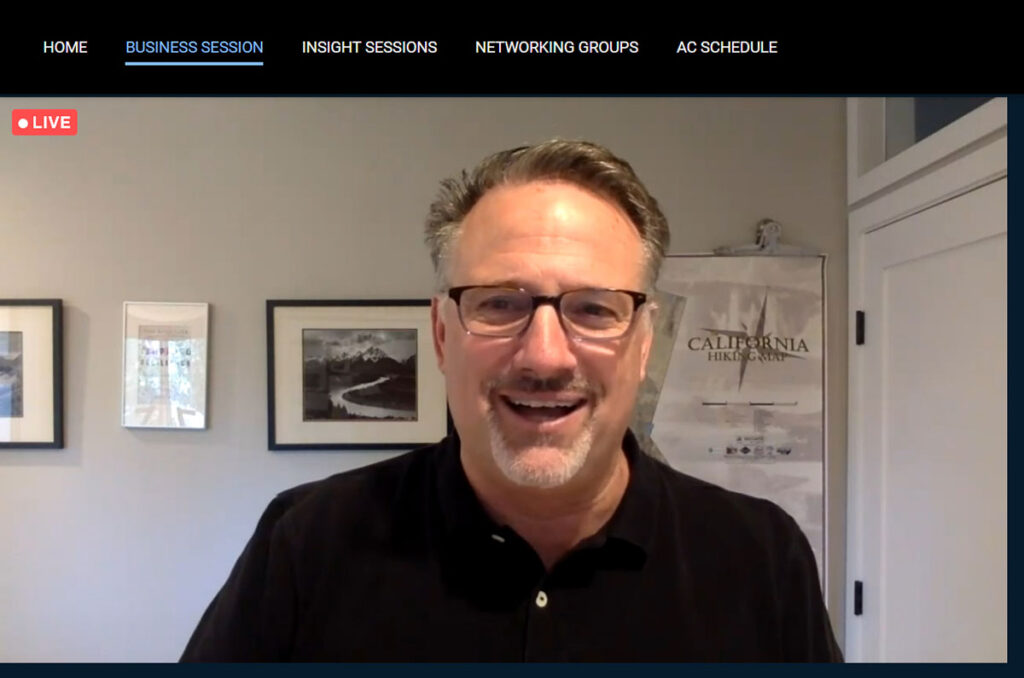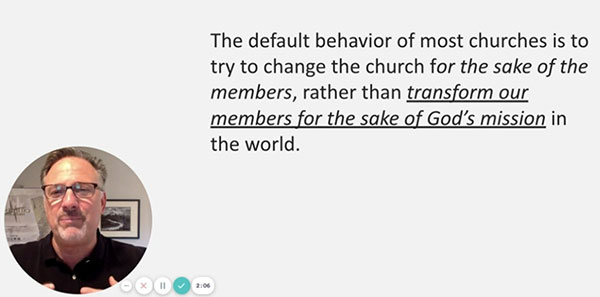By Frank Ramirez
Towards the end of his presentation on “Doing Church in Uncharted Territory,” during the Annual Conference business session, Tod Bolsinger challenged everyone attending to tell a story from their church’s history. The story could be about a hero, about “a cherished moment that is retold over and over again. One that says, ‘This is what we are really all about.’ One that says, ‘This was the moment when I was most proud of us.’ One that says, ‘This was when I knew I found my church home.’”
The purpose, he said, is to separate a church’s aspirational values from “who we truly are.”
That story, he said, is the “charism,” using a Catholic term–the grace-filled characteristic that will serve the pain and needs of the community each church inhabits. That’s where a church should pour its energy, he said, and that will provide the framework for what it means for each individual congregation when it comes to “doing church.”

Bolsinger, a vice president and professor at Fuller Theological Seminary, suggested that the pandemic is allowing congregations to transform themselves to serve a changed world. Most seminaries are training leaders to serve in Christendom, he said, a description of what American churches were a half-century ago when Christianity was the default setting. But in this post-Christendom world, a different sort of leadership is necessary.
Part of what each church needs to do is determine who they really are. It’s not a matter of trying harder, he told the Conference, but of transforming the people of the church, especially the leadership. Bolsinger used the example of someone in a canoe finding themselves in a dry riverbed. Paddling harder will not help.
“That’s where we find ourselves today,” Bolsinger said. “In uncharted territory, adaptation is everything. What are we going to carry with us and what are we going to leave behind?”
Offering Jeremiah 29 as an example, he asked, “How do we adapt to the exile so that the reign and rule of God becomes obvious? … When we offer ourselves not as colonizers or people of great power or imposing our will on others around us, by acts of generosity and love we come to an understanding of how our congregation can make an impact on our world for good.”
This is a process, he said, pointing out that scripture reminds us that “Jesus grew in wisdom and stature.” Like the apostle Paul, “We press on.”
One crucial step is to recover who we really are, hence the need to tell stories about our congregation that identify our values. “For change to last it must be a healthy adaptation of the DNA of the group, our core values. It’s what’s essential.”
In the past year-plus, the world has endured a health pandemic, an economic epidemic, and a social uprising about injustices. “All of our churches have been touched and disrupted by this reality, this combined, complex reality that none of us have never experienced before.” Bolsinger said,
Adventure or die. You have a choice.
In a separate event offered on Thursday of the Conference week, Bolsinger presented at a “moderator’s forum” sponsored by Annual Conference moderator Paul Mundey.
The choice is stark but the figures are undeniable. Studies show that when people are confronted by their doctors with the words, “If you don’t change your life today you’re going to die,” 90 percent will die. They all resolve to change, but only 10 percent succeed.
Bolsinger insists that churches today are facing the same choice. Change the way we do church or die. The problem is most pastors, board chairs, and church members are operating under the assumptions of 50, 60, or 70 years ago, when Americans lived in Christendom. “Everyone assumed the center of culture was law, education, and Christian religion, even if they weren’t Christian…. It is privilege, home court advantage.”
Bolsinger himself, and most pastors and church leaders, were trained to work in Christendom, while actually working in a post-Christendom world. Many “go into deep denial.” Popular techniques to change don’t work, he said, citing studies by Alan Deutschman, author of “Change or Die,” and others. These techniques are fear, facts, and force. “Fear will make people change temporarily. Fear doesn’t produce lasting change. Facts don’t produce change. We can find ways to argue around facts.” And as for force, “You can’t make people change. Maybe temporarily, but not over long periods of time.”

So what does work?
Bolsinger says churches need to relate, repeat, and re-frame: relate to new communities, recognizing that immigrant communities are vital and alive; repeat new practices, growing with each other and supporting each other; and re-frame the way we seek the world, adopting new ways of thinking.
Radical change is needed, not mere tweaking. “You can’t bring radical change by tweaking around the edges,” he said. “By radical I don’t mean reckless or ruthless. Get to the root cause, the key to the challenge in front of us.” The fundamental task of leadership is to distinguish between what needs to be preserved and what needs to change.
“The Spirit of God is often way ahead of us,” he reminded. Lean into the discernment of the Spirit instead of relying on our own institutional power, advised. This requires “a kind of humility and openness…. In your heart deeply believe God’s Spirit has been at work all over the world.”